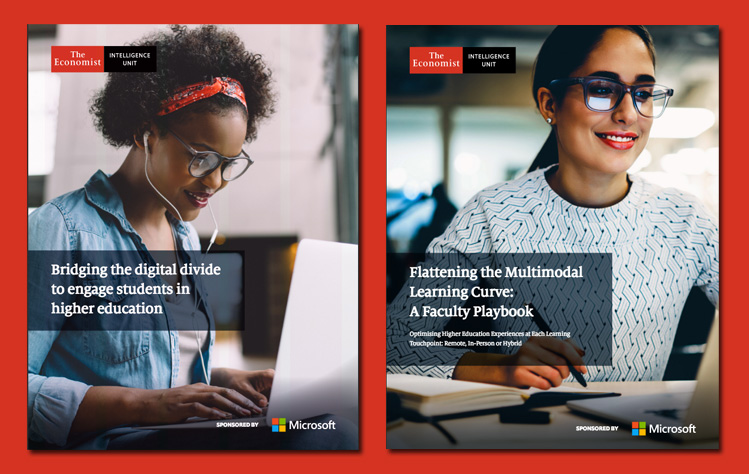Webster Recognized as Online Education Leader in Two Economist Studies
June 17, 2021

Webster University was recognized as a leader in online education in a set of studies issued by the Economist magazine earlier this month. The reports were based on research conducted after most universities and colleges switched to fully online classes at the start of the coronavirus pandemic in 2020.
The reports “Bridging the Digital Divide to Engage Students in Higher Education” and “Flattening the Multimodal Learning Curve: A Faculty Playbook” were issued by the Economist Intelligence Unit (EIU), which conducts market research for the Economist Magazine with sponsorship by Microsoft Higher Education.
“Webster’s early adoption of online education advanced our goal of meeting an unmet need. Our first online offerings immediately provided important access for working adults who could not access night or weekend courses, especially to women in the workforce who were juggling work and family commitments while still pursuing better employment opportunities,” said Webster University Chancellor Elizabeth (Beth) J. Stroble. “As service members were deployed overseas, online programs were key to their continued degree and career advancement. Our online programming is unique to our community, having been built from the ground up and customized to meet the specific needs of our students. We provide the same curriculum to our online students that in-class students receive, and courses are taught by the same faculty, thus assuring that our online students achieve comparable learning outcomes regardless of the means by which courses meet.”
Through asynchronous online learning, the university has cultivated an internal capacity to serve students from across a multitude of time zones spanning Europe and Asia, including a campus in Uzbekistan.
Stroble is quoted in the “Bridging the Digital Divide …” report saying that many institutions of higher education had to make major investments in their remote learning infrastructure to keep up with the sudden demand for online learning due to the pandemic. The study says that recent surveys show that most college students now expect the ability to take some – if not all – of their classes online even after the pandemic ends.
In the “Flattening the Multimodal Learning Curve …” report, Webster University is offered as a case study as an institution that built its remote infrastructure from the ground up to serve its worldwide network of university locations.
“Through asynchronous online learning, the university has cultivated an internal capacity to serve students from across a multitude of time zones spanning Europe and Asia, including a campus in Uzbekistan,” the report says. “As it built out its asynchronous teaching capacity, the creation of its own platform, Webnet Plus, made it possible for someone at a distant location, maybe from one of the university’s campuses or their home or workplace, to tune in to live classes via video connection. Webster set up its own online teaching centre with instructional designers who built content and course shells for every course and established a virtual student access portal where teachers can praise students for things they do well, but which also alerts them if a student is falling behind.”
One recent survey of students in several communications courses found that the students ranked the online experience at an average of 3.8 out of a maximum score of 4.
Webster University has been offering fully online degree programs since 1999. Today, it has more than 50 online graduate, undergraduate, and certificate programs. Its programs have been named among the best in higher education by numerous educational ranking services over the years, including U.S. News & World Report.
To keep the online courses as closely aligned with the in-class experience, faculty members receive resources and assistance from the Webster University Faculty Development Center and Webster University’s Online Learning Center. This allows for more customization and flexibility in building unique experiences for specific classes rather than offering an “out of the box” experience available at many other institutions. Further resources also can be found in Webster’s School of Education, which offers certificates in Mobile Technology in Education and Online Teaching and Learning to equip K-12 educators for this kind of instruction.
Webster’s own internal surveys of student satisfaction have found that students report being extremely satisfied with Webster’s online courses. One recent survey of students in several communications courses found that the students ranked the online experience at an average of 3.8 out of a maximum score of 4.
Webster’s most popular online undergraduate programs (per overall enrollment) include Business Administration, Management, Public Relations and Psychology. Its most popular online graduate programs (per overall enrollment) include Business Administration, Counseling, Cybersecurity, Management and Leadership, and Human Resources Management.
For more information about Webster University’s Online programs, visit Webster University Online (webster.edu).
